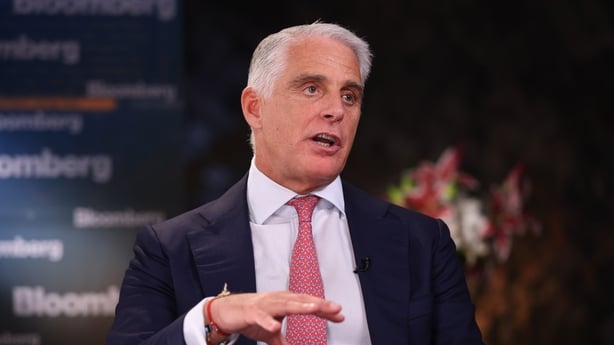[ad_1]
Italy’s UniCredit has today beaten third-quarter profit forecasts as higher rates boosted income, but kept its full-year profit goal, saying it needed time to decide how to best use this year’s “exceptional” growth in earnings.
A higher cost of credit has fuelled record bank profits in recent quarters, but uncertainty has risen, with geopolitical risks adding to strains on the economy from stubbornly high inflation and fast-shrinking loan volumes.
Unicredit is Italy’s only bank considered to be of global systemic relevance.
It said today that its net profit came to €2.3 billion in the three months to September, well above a consensus forecast by the bank of €1.9 billion and up 36% from a year ago.
Shares rose more than 2% in early trading.
Income from the gap in lending and deposit rates, on which Italy in August slapped a surprise one-off tax, rose 45% year-on-year.
After spooking investors in Italian banks with the extraordinary levy, Italy backtracked, giving lenders the option to set aside money as reserves instead of paying it.
UniCredit, the first Italian bank to report third-quarter earnings and take an official decision on the tax, said it was putting aside €1.1 billion as reserves.
Most Italian banks, including market leader Intesa Sanpaolo, are expected to forego paying the tax, which could be damaging to shareholders and strengthen capital instead, sources have told Reuters.
UniCredit slightly raised its 2023 revenue outlook, thanks to the boost from rates, but kept its profit and investor reward goals unchanged.
“We’re reviewing all the options that we have and therefore giving you a new guidance for the bottom line and distribution is premature, but that does not mean that those numbers will remain the same,” CEO Andrea Orcel told a media call.

UniCredit forecasts a net profit of at least €7.25 billion in 2023 and will pay out as dividends and share buybacks at least €6.5 billion.
It confirmed distribution plans yesterday when it announced the purchase of a 9% stake in Alpha Bank from Greece’s bank bailout fund and the merger of its Romanian unit with that of Alpha.
While still extremely low, provisions against loan losses more than doubled in the quarter. Loan volumes stagnated in Germany and declined 3% in Italy.
The reduction in risk-weighted assets (RWAs) contributed to lifting core capital to 17.2% of RWAs, up from 16.6% at the end of June.
It would be at 16.3% taking into account a decision to buy back shares with €2.5 billion of 2023 profits, which UniCredit is planning to do before the end of the year.
It is awaiting supervisory clearance while shareholders will gather on Friday to vote on the plan.
Orcel, who took over in 2021, has embraced a capital-light model to maximise profits in relation to the capital deployed to support businesses.
[ad_2]
Source link
